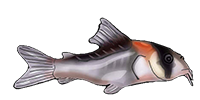For anyone that actually cares at this point, I arrived at this discussion after a long standing member of Planet Catfish directed it to me during a personal discussion on the phone that we were having. I don't go trolling online, for anything. I recognized the name, and said that I would have a look.
Secondly, I have never once claimed to be an expert, on anything. Have I been kicking around this hobby for a long time, yep. Have I tested numerous foods over the years, yep. I'm an old fart that is old enough to remember when dried ant eggs were considered primo food. And commercial foods such as this.

An expert, nope, but I've been around long enough to know a thing or two about feeding fish, and the science behind a lot of it. I also do my best to stay current with that science. That doesn't mean that I blindly believe every claim made in every study or peer reviewed journal. Not even close. As I stated earlier in this discussion, in many ways I am the original sceptic.
At the same time I certainly don't ignore ALL of the science, and definitely not when numerous studies performed by numerous non-biased accredited individuals from around the globe all come to the exact same conclusion.
Real studies Clay, performed by those who have no real dog in this fight.
I have also stated many times over the years that carnivorous species of fish (at least those tested thus far) do not do well on high dietary carbohydrate loads. But that doesn't equate to all carnivorous fish not being able to assimilate & utilize no more than 5% in captivity. In fact. of those species studied to date, most seem to be able to easily handle up to 20%, some more, depending on the species of fish, and the source of the carbohydrates. And the data that is available on this subject goes beyond just growth, Clay. These are just simple undisputed (by science) facts. You can debate the science until you are blue in the face, but unless you have something to actually counter that science, your opinion is just that, an opinion. As Andy just stated, without proper method and documentation all you have is anecdotal evidence.
With regards to soybean meal & NLS. New Life hasn't used soybean meal in any of their formulas for well over 10 years, probably closer to 15 years. Soybean Isolate, but not soybean meal - and as already stated in this discussion soybean isolate and/or concentrate do not contain the anti-nutritional matter found in soybean meal. Just so you know, The vendor that you posted the link to has been using the same outdated ingredient list on his website for years. It was already outdated the first time that he posted it. New Life also stopped using soybean isolate over a year ago, probably over 2 yrs ago, I don't recall exactly but it wasn't long after Pablo started making his own food in his own manufacturing facility. Just another tweak in an evolving world of science and economics. There may be some older labels still being utilized, but moving forward NLS no longer contains any form of soy. A move that I was thrilled to hear about, as I had been giving Pablo a hard time about soy (even isolate) for years.
And thank you Andy for explaining what amylase is, and isn't.
Clay, you have lots to learn, but that isn't going to happen if you aren't willing to open your eyes and not be so biased towards those who really have made a difference in this area over the past 25 years. And I'm not just referring to one man and his food. And just so you know, 30+ yrs ago when Pablo, Rick, and Rick's brother parted ways - those boys were all feeding mash made up from baby food & vitamins. It was nothing more than a poorly constituted dough ball - absolutely nothing even remotely close to what Pablo created many years later. Back then those gents didn't have two plug nickels to their name, you think they had the $$$$$ to feed pond fish , antarctic krill, herring, squid, algae meal, spirulina, etc? Are you kidding me? lol
Just because Rick is good at telling fairy tales, doesn't mean that they are true.
The fact of the matter is you are feeding a high density, high fat food to fish that don't normally eat food of such high protein and fat concentrations. You can get good results in the short term but you also run the risk of developing fatty liver disease and you increase the nitrogenous waste input into the environment.
Whereas feeding a food with a more typical level of protein and fat that is decreased in density with the addition of wheat flour as a binder will not cause any harm to the fish, the aquarium ecosystem, and produce the same results.
Exactly.





